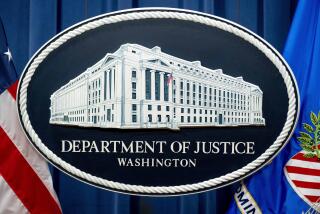U.S. forces capture suspect in slaying of sheik in Iraq
- Share via
BAGHDAD — The U.S. military said Sunday that its forces had captured an Iraqi suspected in the killing of a tribal leader who had helped organize local forces against Al Qaeda-linked insurgents in Anbar province.
The slaying of Abdul Sattar Rishawi on Thursday was part of a plot by militants to kill leaders of the Anbar Salvation Council, a coalition of tribes, military officials said. Rishawi organized the council to assist U.S. forces in battling Al Qaeda in Iraq, which sought to control the Sunni-dominated province west of the capital.
Key to the plot, the military said, was Fallah Khalifa Hiyas Fayyas Jumayli, also known as Abu Khamis. Jumayli was arrested south of Ramadi, Anbar’s capital.
“He was involved in the planning and execution of the plot to kill the sheik,” said Rear Adm. Mark I. Fox, a U.S. military spokesman. “He was also plotting to kill other members of the . . . council. He was also involved in organized activities including car bombs and suicide attacks in Anbar province.”
U.S. forces had captured several men in the last two months who they believed worked for Jumayli, supervising bombings and other attacks, said Maj. Jeff Pool, another military spokesman. Five days before Rishawi’s killing, soldiers captured members of the militant leader’s group, and afterward they were able to track down Jumayli.
“The information which we received following his death directly implicated him in Sattar’s death in a clear and unmistakable way,” Pool said.
The Islamic State of Iraq, an umbrella radical group that includes Al Qaeda in Iraq, claimed responsibility for the killing in a website declaration. On Saturday, the militants warned that they would step up attacks during the month of Ramadan, the Muslim period of fasting that began last week.
Nearly three dozen people were reported killed Sunday in gunfire and bombings across the country. In Baghdad, military officials presented their case at a news conference that violence in the capital may be decreasing.
As a measure of the scale of violence, the highest monthly tally of killings in Baghdad, last November, exceeded the most violent year in Los Angeles County history by more than 100 homicides.
Civilian deaths in Baghdad fell from a monthly high of 2,221 in November to 980 in August, the U.S. military reported. The numbers could not be independently verified.
By comparison, homicides in Los Angeles County, which has a population about twice that of Baghdad, reached a peak of 2,113 killings in 1992, when gang rivalries and the spread of crack cocaine fueled peak levels of violence.
“With respect to Al Qaeda, we think they have been clearly neutralized here inside Baghdad,” said Brig. Gen. Joe Anderson.
Referring to the troop buildup ordered this year by President Bush, he added, “We always knew with the surge in forces, by the increased presence of boots on the ground in the 10 security districts, we would be successful in pushing them out.”
But the successive rounds of killings and retaliations, many of them apparently driven by sectarian hatred, continued in the capital Sunday.
Two municipal councilmen were killed in attacks by gunmen in the capital’s south; a mortar round killed one person and injured three near the soccer stadium in the east; and private security guards allegedly opened fire west of downtown, killing nine people and injuring 15. The guards began shooting after a U.S. State Department motorcade came under attack, Agence France-Presse reported.
The bodies of a dozen men also were found in various parts of Baghdad.
Elsewhere, gunmen killed 14 people and injured seven in an attack in a village northeast of the capital in Diyala province. In Tuz Khurmatu, 135 miles north of Baghdad, a suicide bomber killed six people having tea at a restaurant. In Hillah, 60 miles south of the capital, a clash between tribesmen and gunmen left one bystander dead.
--
ned.parker@latimes.com
Times staff writer Raheem Salman, special correspondent Usama Redha and other special correspondents contributed to this report.
More to Read
Sign up for Essential California
The most important California stories and recommendations in your inbox every morning.
You may occasionally receive promotional content from the Los Angeles Times.









